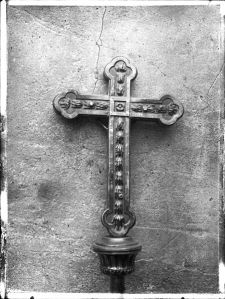“Christianity is a battle, not a dream.” – Wendell Phillips
I’ve written before about my ongoing struggle with fear. I hold tight to the promises of peace, trusting in the nearness of God to be my good. I memorize verses that tell me that He is my refuge. I pray loud that God is my only security, that only in Him can I be safe. Which is why I came up short the other day to find I was wrong.
Nowhere am I promised to be safe. Oh, He will be my refuge. His nearness is, in fact, my good. He will become my security, but my insatiable need to feel safe will never be met this side of heaven. I stumbled across one of those charts that you’ve probably seen before. The ones that contrast “fleshly thinking” with “spirit-filled thinking.”
And this one sets the desire for peace against the acknowledgment that we are in a battle:
“Is self-complacent; craves the peace of mind that relieves him of unwelcome responsibilities.”
vs.
“Knows that warfare between good and evil will not allow undisturbed peace.[1]”
I’d heard before that peace doesn’t necessarily mean everything goes perfectly. You only have to look at the cross to recognize that Jesus didn’t mean “trouble free” when he said “My peace I give to you.”
I’d heard how He doesn’t promise to take the storm away, but that He gives you peace in the midst of the storm.
But what if it’s not just a promise to help us endure the storm? What if it’s a call to get out there and stir one up?
I spend so many hours hoping that tragedy doesn’t strike that I’m not even truly living. I remember watching my six-year-old waver on the edges of the dodgeball game during kindergarten recess. The thought of getting hit with the ball was just too much for him. I can relate.
But here’s the truth, the one I need to sink down into the depths of my soul: The ball might hit you, and it might hurt, but staying on the sidelines means you never get to play the game.
Lisa Bevere states it this way:
“Becoming who God created you to be is both your best offense and your best defense against the enemy’s strategies. He obviously didn’t stop you from drawing breath. It is now time to keep him from stifling the spiritual seed God planted inside you. When the enemy oppresses, it is always because he fears what we might become.”
I think that’s true. The next best thing to making sure you were never born or killing you outright, is sentencing you to a living death where you do absolutely nothing. Self-preservation is the opposite of the gospel, so how is that I’ve been telling myself God will help me with my pet project of self-security?
Preserving your life doesn’t save it. It just keeps it. And what good is a well-kept life?
I want a well-spent one. Whole-heartedly, frivolously, even recklessly poured out, because we’ve joined His game, and it’s a wild one.
“Ours should not be the love that asks, ‘How little?’ but ‘how much?’;
the love that pours out its all and revels in the joy of having anything to pour on the feet of its Beloved.
The question ‘what is the harm?’ falls from us and is forgotten when we Calvary, the Crucified, and the risen-again Rabboni of our Souls.”
–Amy Carmichael
[1] Beyond Ourselves, pg. 192






